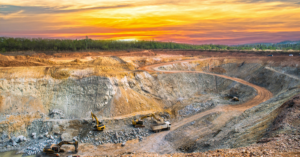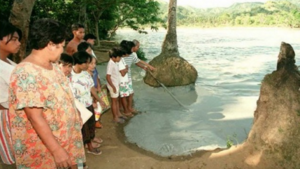The Government of Canada claims that existing Canadian mining practices are global models for responsible and sustainable mining. But is this the reality in local mining communities in underdeveloped nations?

Canadian Mining Companies and Corporate Negligence
Canada is commonly known for its diplomacy. Yet not many know that Canada is the world’s global mining leader. Home to approximately 75% of the world’s mining corporations, Canadian mining assets abroad are valued at approximately $177.8 billion. In recent decades, the Canadian mining industry has been criticized for being directly and indirectly involved in widespread environmental devastation, human rights abuse, systematic rape, extrajudicial killings, and tax evasion, amongst other forms of egregious corporate abuse.
Despite ongoing corporate negligence, Canada remains a strong judicial and financial haven for the extractive sector. The Canadian state protects the mining industry through permissive domestic regulatory structures and voluntary mechanisms of accountability. To this date, no Canadian legislation exists which holds corporations accountable for their operations overseas. United Nations experts affirm that governments possess the power to regulate & sanction individuals and entities abusing human rights, asserting that states remain “complicit themselves when they do not take remedial measures.” Rather than the passage of binding law, voluntary mechanisms under the umbrella of corporate social responsibility (CSR) have prevailed in regulating the mining industry.
The impacts of these issues are felt heavily in the Philippines, where 15 percent of the operating mining companies have established links to Canada, according to the Ministry of Mines. This number may appear small, but the lack of transparency in beneficial ownership puts this into question. Several mining companies that operate in the Philippines are officially listed as Filipino-owned, but mining accountability advocates claim that they are backed by foreign capital.
Infamous examples of negligent Canadian mining operations in the Philippines
- Canadian Placer Dome, which owned 40% of shares within the Marcopper Corporation, caused one of the Philippines’ worst environmental disasters in 1996. Over 200 million tons of mine tailings spilled into Calancan Bay, resulting in devastating effects to the ecosystem, health and livelihoods in the region. To this day, environmental externalities from the spill persist, with little to no liability imposed for the corporation’s devastation.
- Toronto Ventures Resource Development Inc, accused of land grabbing in Mindanao and the displacement of Indigenous Subanon peoples within the Canatuan mine in 2014
- Australian-Canadian company Oceana Gold’s Didipio Mine was accused of the violent demolition of 187 houses with no compensation or resettlement options, polluted surface water, land loss, and extrajudicial killings of activists resisting company operations.

Photo of the Makulapnit-Boac river system after the Marcopper Mining spill in 1996. (Source: Rappler.com)
Mining in the Philippines – by the Numbers
Despite increasing foreign investment in the Philippine mining industry, mining has not delivered expected economic returns. Poverty incidence in the Philippines continues to stand at 25-26 percent at the national level and 30-60 percent in large-scale mining provinces. To this date, the mining industry contributes a minuscule 0.89% to the Philippines ‘ Gross Domestic Product. The externalities of large-scale mining have heavily impacted Indigenous peoples in the Philippines.
With over 60 percent of transnational mines currently operating in ancestral domains in the Philippines, clashing worldviews on land ownership and environmental devastation have caused increasing conflict. Government responses to mining resistance movements have led to extrajudicial killings of Indigenous leaders, the classification of activists as terrorists and the bombing of Indigenous schools.
A 2020 Global Witness report recognized the Philippines as the second deadliest place in the world to be an activist and land defender, with mining being the most dangerous sector globally. The Philippine government has employed widespread militarized violence against citizens exercising their rights to freedom of expression and assembly. Between 2015-2019, there have been 208 reported murders of human rights defenders, journalists and trade unionists. Canada is highly implicated in the Philippines’ human rights abuses, with Canada historically providing financial aid for military equipment to the Philippines.
Moving Forward Responsibly
Mining plays a critical role in global society, yet the Canadian government cannot remain complicit in the exploitative ways natural resources are being extracted within developing nations. What can we do? We can take action. These are only a few of many ways to ensure human and environmental rights are upheld in the mining industry.
- We need to push the Canadian government to implement strong binding regulatory mechanisms for accountability, such as mandatory human rights due diligence legislation
- We need a public ownership registry that identifies corporate owners and exposes white-collar crime rampant in the mining industry, such as money laundering and tax evasion.
- Degrowth. We need to reduce our consumption habits and advocate for a society where socio-ecological well-being takes precedence over corporate profits and excess-accumulation.
- We need to lobby governments in Canada to empower ombudspersons within the mining industry with judicial power, which enable victims overseas to seek effective remedy in home states
- Last but not least, education is power. We need to raise awareness of mining injustices and the dynamics between the Global North and Global South, which enable corporate abuse with impunity. We need to continue to mobilize action, fundraise for affected local communities, and support critical NGOs within this field.
Note: This blog is written in a personal capacity and does not reflect the opinions of the organizations in which the authors are connected to.
Published May 6, 2021

Angela M. Asuncion is a MSc Rural Planning and Development in International Development student at the University of Guelph. Her research interests are focused on environmental governance and conservation at both local and international levels. Furthermore, her research directly aligns with strengthening socio-ecological systems and policies in underrepresented communities. (Twitter handle, @angelactivist)

John Edison Ubaldo is an MA Anthropology student at the College of Social Sciences and Philosophies, University of the Philippines – Diliman. As an undergraduate student, he was involved with various disaster management researches facilitated by CSOs in multiple areas within Luzon and Visayas. He has since pursued a career in research focusing on community development and local knowledge. MA Anthropology (Twitter handle, @makatanghiker)
Are you currently involved with regional research, policy, and development? The Regional Studies Association is accepting articles for their online blog. For more information, contact the Blog Editor at rsablog@regionalstudies.org.